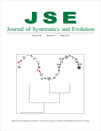
JOURNAL OF MOLECULAR EVOLUTION
Scope & Guideline
Exploring the Nexus of Molecular Mechanisms and Evolution
Introduction
Aims and Scopes
- Molecular Phylogenetics:
The journal emphasizes studies that utilize molecular data to elucidate evolutionary relationships among species, providing insights into the tree of life and evolutionary history. - Functional Genomics and Proteomics:
Research articles often focus on the functional aspects of genes and proteins, exploring how molecular changes contribute to phenotypic diversity and adaptation in various organisms. - Evolutionary Developmental Biology (Evo-Devo):
The journal covers topics that integrate evolutionary biology with developmental processes, examining how changes at the molecular level affect organismal development and diversity. - Origin of Life Studies:
Papers investigating the molecular origins of life, including prebiotic chemistry and early evolutionary transitions, are a significant part of the journal's scope. - Comparative Genomics:
The journal publishes research that compares genomic data across species to identify evolutionary patterns, adaptations, and functional innovations. - Evolutionary Mechanisms:
Studies on the mechanisms driving molecular evolution, including selection, mutation, genetic drift, and gene flow, are central to the journal's focus. - Molecular Ecology:
Research exploring the intersection of molecular biology and ecology, particularly how molecular evolution influences and is influenced by ecological interactions.
Trending and Emerging
- Genomic Adaptation and Evolutionary Resilience:
Recent studies have increasingly focused on how various organisms adapt at the genomic level to environmental stresses, including climate change and disease, signaling a growing interest in evolutionary resilience. - RNA Evolution and Function:
There is a notable rise in research examining the role of RNA beyond its traditional functions, including studies on RNA editing, non-coding RNAs, and their evolutionary implications. - Interdisciplinary Approaches to Evolution:
Papers that integrate molecular evolution with computational biology, bioinformatics, and systems biology are on the rise, indicating a trend towards more complex and interdisciplinary research. - Evolution of Immune Responses:
The journal has seen an increase in studies focusing on the molecular evolution of immune systems across different taxa, reflecting the growing interest in evolutionary immunology. - Synthetic Biology and Evolutionary Engineering:
Emerging themes also include the application of synthetic biology concepts to understand evolutionary processes, highlighting a trend towards engineering biological systems with evolutionary insights. - Functional Genomics in Ecological Contexts:
There is a rising trend in the exploration of how functional genomics intersects with ecological and evolutionary processes, particularly in understanding adaptations to specific environments.
Declining or Waning
- Classical Morphological Studies:
There has been a noticeable decline in papers focusing solely on morphological aspects of evolution, as the emphasis shifts towards molecular and genetic analyses. - Population Genetics Without Molecular Tools:
Studies that rely on traditional population genetics methods without integrating molecular data are becoming less common, as more researchers adopt molecular approaches. - Phylogeography Based Solely on Morphological Data:
Research that combines geographical distribution with morphological data alone has waned, reflecting a shift towards molecular phylogeography that utilizes genetic data for more robust conclusions. - Laboratory Evolution Studies with Limited Molecular Insight:
Papers that explore laboratory evolution without comprehensive molecular analysis are less frequently published, as the field increasingly values detailed molecular and genomic insights.
Similar Journals

MOLECULAR PHYLOGENETICS AND EVOLUTION
Exploring Molecular Pathways to Evolutionary InsightsMOLECULAR PHYLOGENETICS AND EVOLUTION is a premier international journal published by Academic Press Inc, Elsevier Science, focusing on the intricate relationships and evolutionary processes among organisms through the lens of molecular data. With an ISSN of 1055-7903 and an e-ISSN of 1095-9513, the journal is widely regarded for its high-impact research articles, boasting impressive category quartiles: Q1 in Ecology, Evolution, Behavior and Systematics, and Genetics, and Q2 in Molecular Biology as of 2023. These metrics position the journal as a significant contributor to the fields it encompasses, attracting a global audience of researchers, professionals, and students. The journal's impact is underscored by its Scopus rankings, which reflect its prominence in agricultural and biological sciences, particularly within its specialized categories. Aimed at advancing the understanding of phylogenetic relationships and evolutionary biology, this journal publishes cutting-edge research that is not only relevant but also essential for those engaged in evolutionary studies. Although open access options are not currently available, the rich content remains accessible to an academic readership dedicated to exploring the complexities of molecular evolution. Since its inception in 1992, the journal continues to evolve, promising to be at the forefront of scientific discovery through 2024 and beyond, encouraging submissions that push the boundaries of knowledge in molecular phylogenetics.

PROCEEDINGS OF THE ROYAL SOCIETY B-BIOLOGICAL SCIENCES
Bridging Disciplines for Scientific ExcellencePROCEEDINGS OF THE ROYAL SOCIETY B-BIOLOGICAL SCIENCES, published by the esteemed Royal Society, stands as a premier platform for disseminating cutting-edge research in the fields of Biological Sciences. With an impressive impact factor reflective of its high citation rates and scholarly contributions, this journal encompasses a wide array of disciplines, including Agricultural and Biological Sciences, Biochemistry, Genetics and Molecular Biology, Environmental Science, and Immunology and Microbiology, consistently ranking in the Q1 category across these fields. Since its inception in 1946, it has been committed to advancing our understanding of biological systems and informing evidence-based practices. Researchers and academics can submit their work without the Open Access barrier, thereby maintaining the integrity of the disciplinary discourse while providing comprehensive insights. The journal's location in the United Kingdom also positions it at the heart of global scientific innovation, making it a vital resource for professionals and students alike who are eager to explore the latest trends and breakthroughs in the biological sciences.

GENE EXPRESSION PATTERNS
Decoding the Language of GenesGENE EXPRESSION PATTERNS, published by Elsevier, is a peer-reviewed academic journal specializing in the field of developmental biology, genetics, and molecular biology. With the ISSN 1567-133X and E-ISSN 1872-7298, it has been a crucial platform for researchers since its inception in 2001. Although classified in the Q4 quartile across its relevant categories for 2023, the journal plays an essential role in disseminating innovative studies that shed light on intricate gene expression mechanisms. Located in Amsterdam, Netherlands, the journal aims to provide a comprehensive understanding of gene regulation through rich analyses and original studies, thus appealing to a wide audience, including esteemed researchers, dedicated professionals, and enthusiastic students in the biomedical arena. Access to this journal is not open, which underscores the necessity of institutional subscriptions for full articles, reinforcing its targeted dissemination of specialized knowledge in gene expression.

Open Biology
Pioneering interdisciplinary research for a better tomorrow.Open Biology is a prestigious, interdisciplinary journal published by the Royal Society that has been paving the way in the fields of Biochemistry, Genetics and Molecular Biology, Immunology, and Neuroscience since its inception in 2011. Catering to a global audience of researchers, professionals, and students, Open Biology operates under an open access model, facilitating the unrestricted dissemination of high-quality research findings. With a current impact factor that positions its categories in the top quartile (Q1) and impressive Scopus rankings—evidencing its influence and reach—this journal serves as a vital platform for innovators and scientific inquiries aimed at advancing our understanding of life sciences. The journal's commitment to publishing cutting-edge research makes it an essential resource for those at the forefront of scientific exploration.

JOURNAL OF EUKARYOTIC MICROBIOLOGY
Advancing Knowledge in Eukaryotic MicrobiologyJOURNAL OF EUKARYOTIC MICROBIOLOGY, published by WILEY, stands as a vital resource within the field of microbiology since its inception in 1993. With its ISSN 1066-5234 and E-ISSN 1550-7408, this journal provides a platform for the dissemination of high-quality research focused on the biology of eukaryotic microorganisms, including fungi, protozoa, and algae. The journal currently holds a Q3 ranking in the microbiology category, highlighting its significant contribution to scientific discourse in the field. With a multi-disciplinary approach, it encourages submissions that push the boundaries of understanding in areas such as microbiological ecology, phylogenetics, and molecular microbiology. While it does not offer open access, it remains widely accessible to researchers and academics through institutional subscriptions. As the journal progresses towards its converged years ending in 2024, it continues to be a beacon for students, professionals, and researchers alike who seek to explore and advance their understanding of eukaryotic microorganisms.

Evolutionary Bioinformatics
Unlocking the secrets of evolution through bioinformatics.Evolutionary Bioinformatics, published by SAGE Publications Ltd, is a pioneering open-access journal established in 2005, dedicated to advancing the field of evolutionary biology through innovative computational techniques and bioinformatics. With an ISSN of 1176-9343, it serves as a critical platform for researchers, professionals, and students to disseminate impactful findings and foster collaboration across disciplines. The journal spans a broad scope, contributing significantly to the areas of Ecology, Evolution, Behavior and Systematics, and Genetics, as evidenced by its respectable Scopus rankings and quartile placements in 2023. With a commitment to providing comprehensive, peer-reviewed research articles and tools for sharing knowledge, Evolutionary Bioinformatics plays an essential role in shaping the future of evolutionary studies and bioinformatics. Readers and contributors alike are encouraged to engage with cutting-edge research that pushes the boundaries of understanding in this dynamic field.

JOURNAL OF EVOLUTIONARY BIOCHEMISTRY AND PHYSIOLOGY
Illuminating Evolutionary Adaptations Through Biochemical ResearchJOURNAL OF EVOLUTIONARY BIOCHEMISTRY AND PHYSIOLOGY, published by PLEIADES PUBLISHING INC, is a pivotal periodical that delves into the intricate relationships between biochemical processes and evolutionary dynamics. With its ISSN 0022-0930 and E-ISSN 1608-3202, this journal serves as a comprehensive platform for researchers, professionals, and students dedicated to understanding the physiological adaptations and biochemical mechanisms influenced by evolutionary pressures. Although it is not an open access journal, it offers valuable insights across its historically significant coverage spanning from 1972 to 2017, making it an essential resource for those working in agricultural, biological, and molecular sciences. Despite its current Scopus rankings revealing limited visibility within its fields, the journal remains committed to fostering scholarly dialogue and advancing knowledge in the realm of evolutionary biochemistry, especially for those exploring the ecological, genetic, and integrative physiological aspects of life.

NATURE REVIEWS GENETICS
Transforming Knowledge into Genetic Understanding.NATURE REVIEWS GENETICS, published by NATURE PORTFOLIO, stands as a leading journal in the field of genetics, boasting a remarkable reputation reflected in its Q1 ranking across multiple categories including Genetics, Clinical Genetics, and Molecular Biology. With an impressive percentile of 99th in both Genetics and Clinical Genetics, as well as a solid rank in Molecular Biology, this journal is pivotal for researchers, professionals, and students alike who seek to stay informed on the latest advancements and comprehensive reviews in genetic research. The journal's scope encompasses a wide array of topics, providing in-depth insights from fundamental genetic principles to clinical applications, underscoring its importance in bridging basic science and medical practice. Though not an open-access publication, it remains accessible through various academic institutions, enhancing its reach and influence within the scientific community. With publication years spanning from 2000 to 2024, NATURE REVIEWS GENETICS continues to shape the future of genetics research and education.

Journal of Systematics and Evolution
Connecting Researchers Through Open Access ScienceThe Journal of Systematics and Evolution, published by WILEY, is a premier academic journal dedicated to advancing the fields of Ecology, Evolution, Behavior, and Systematics and Plant Science. With a distinguished Q1 ranking in both of these critical categories in 2023, it stands at the forefront of scientific research, placing it in the top quartile among its peers. Featuring both an ISSN of 1674-4918 and an E-ISSN of 1759-6831, the journal has been converging innovative research since its inception in 2008. The journal caters to a global audience of researchers, professionals, and students, providing a platform for disseminating significant findings and fostering academic dialogue. Its impressive Scopus rankings further affirm its impact, coming in at Rank #62/721 in Ecology and Rank #48/516 in Plant Science, highlighting its relevance and influence in these vibrant fields. As an open-access journal, it ensures that groundbreaking research is accessible to all, thus enhancing collaborative opportunities within the scientific community.

CURRENT GENETICS
Unveiling the Future of GeneticsCURRENT GENETICS is a prestigious journal published by SPRINGER, dedicated to advancing the field of genetics through the dissemination of high-quality research. With a notable impact factor and ranking in the Q2 category for both Genetics and Medicine (miscellaneous) as of 2023, it firmly establishes itself as a significant resource for the academic community. The journal’s comprehensive scope explores the latest findings in genetic research, along with accompanying interdisciplinary studies, providing a platform for researchers to share innovative ideas and methodologies. ISSN: 0172-8083, E-ISSN: 1432-0983, stands testament to its commitment to scholarly excellence. While Open Access options are not currently available, CURRENT GENETICS remains accessible to a broad audience, promoting a rich exchange of knowledge that supports the vast and evolving discipline of genetics. Since its inception in 1979 and through its converged years till 2024, this journal has played a crucial role in confronting scientific challenges and promoting advancements in genomic medicine and molecular biology. As such, it is an essential read for researchers, professionals, and students keen to remain at the forefront of genetic research.